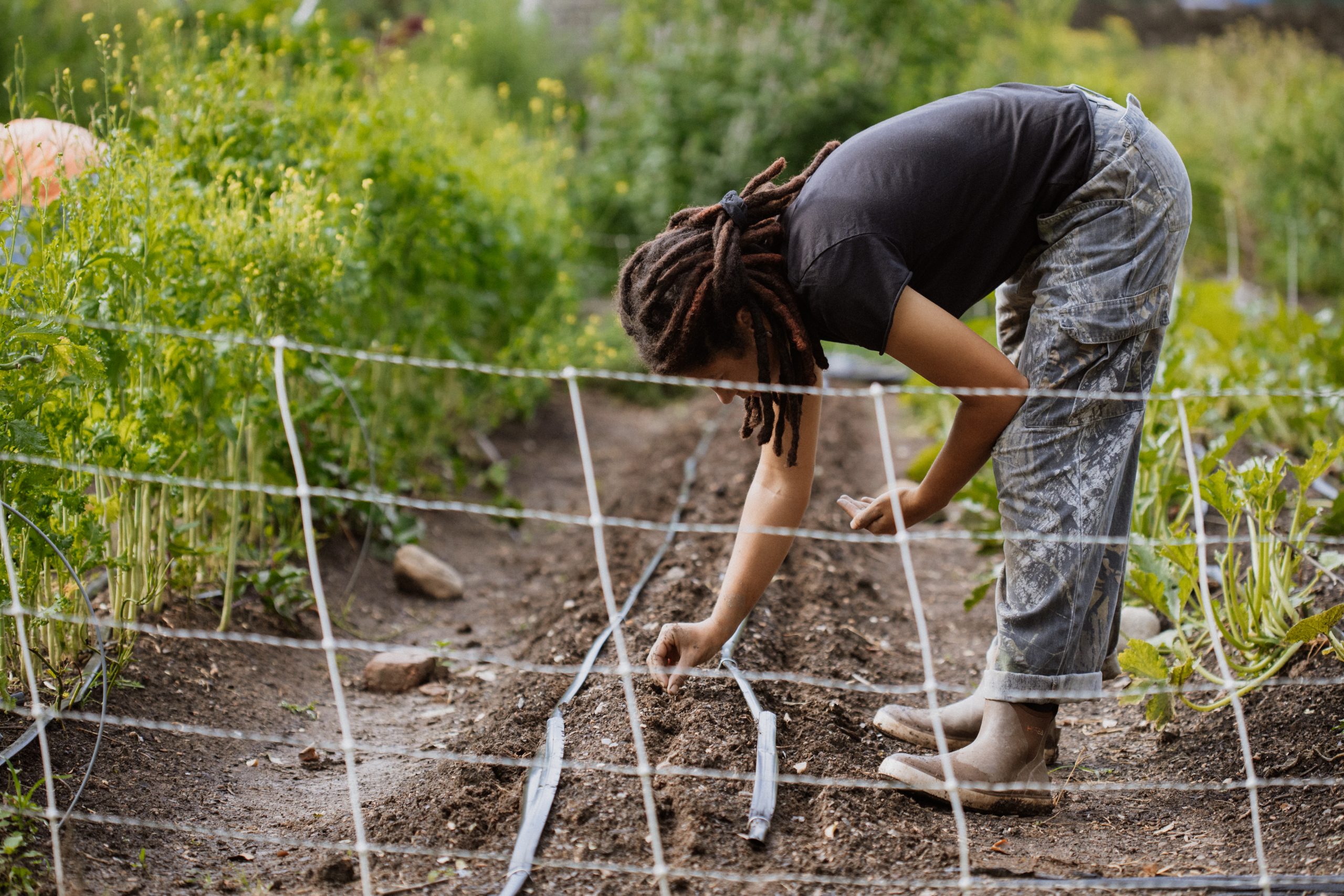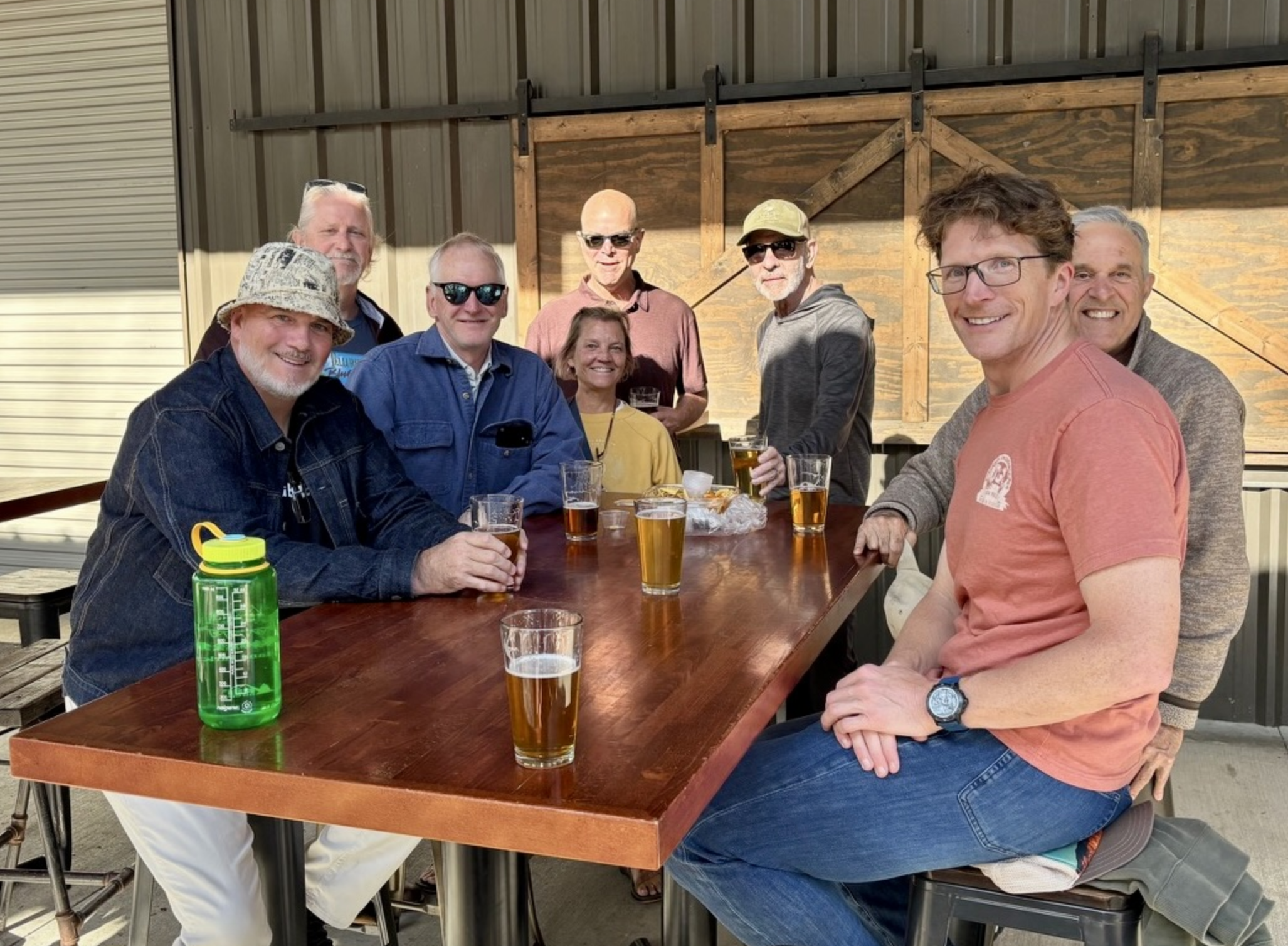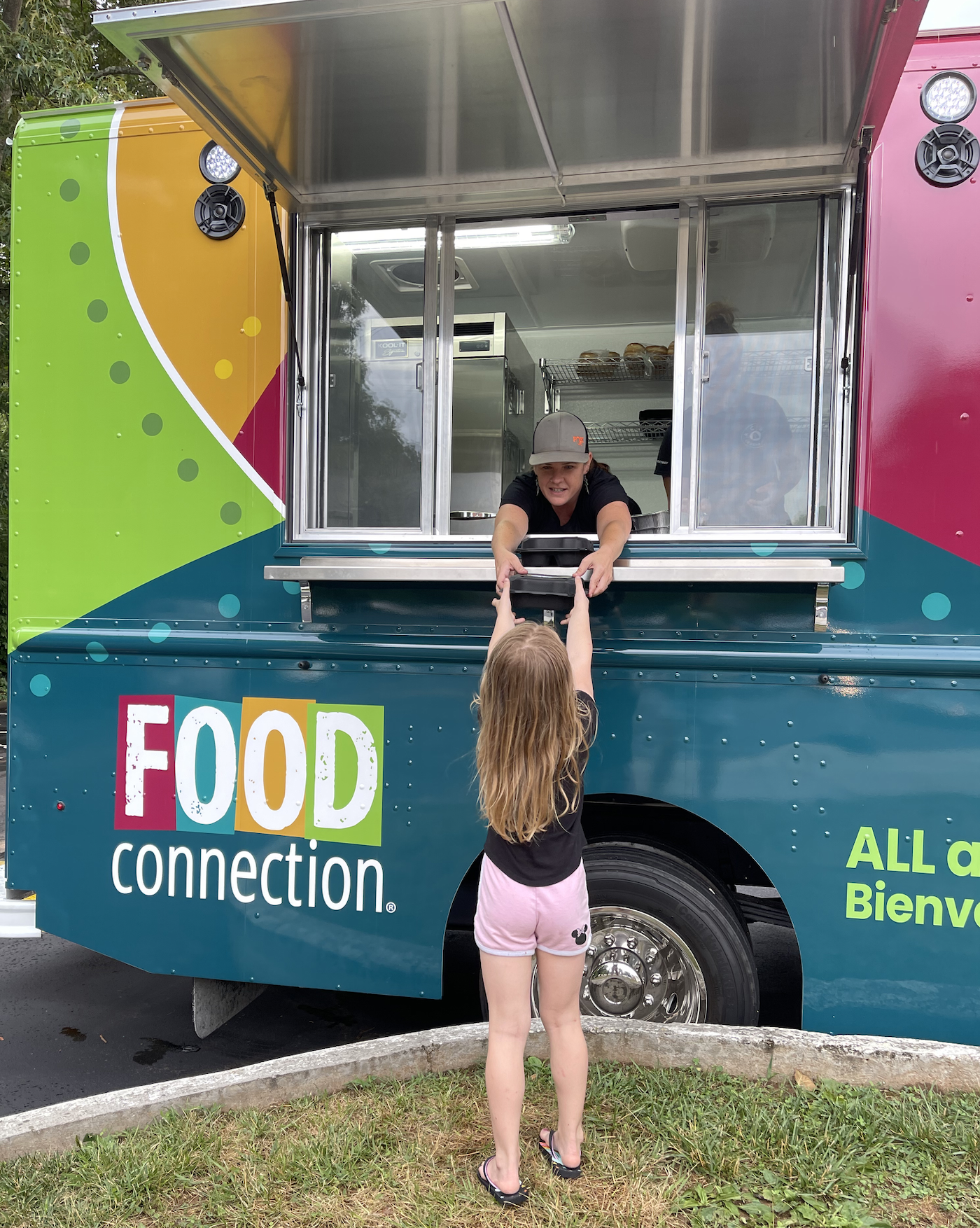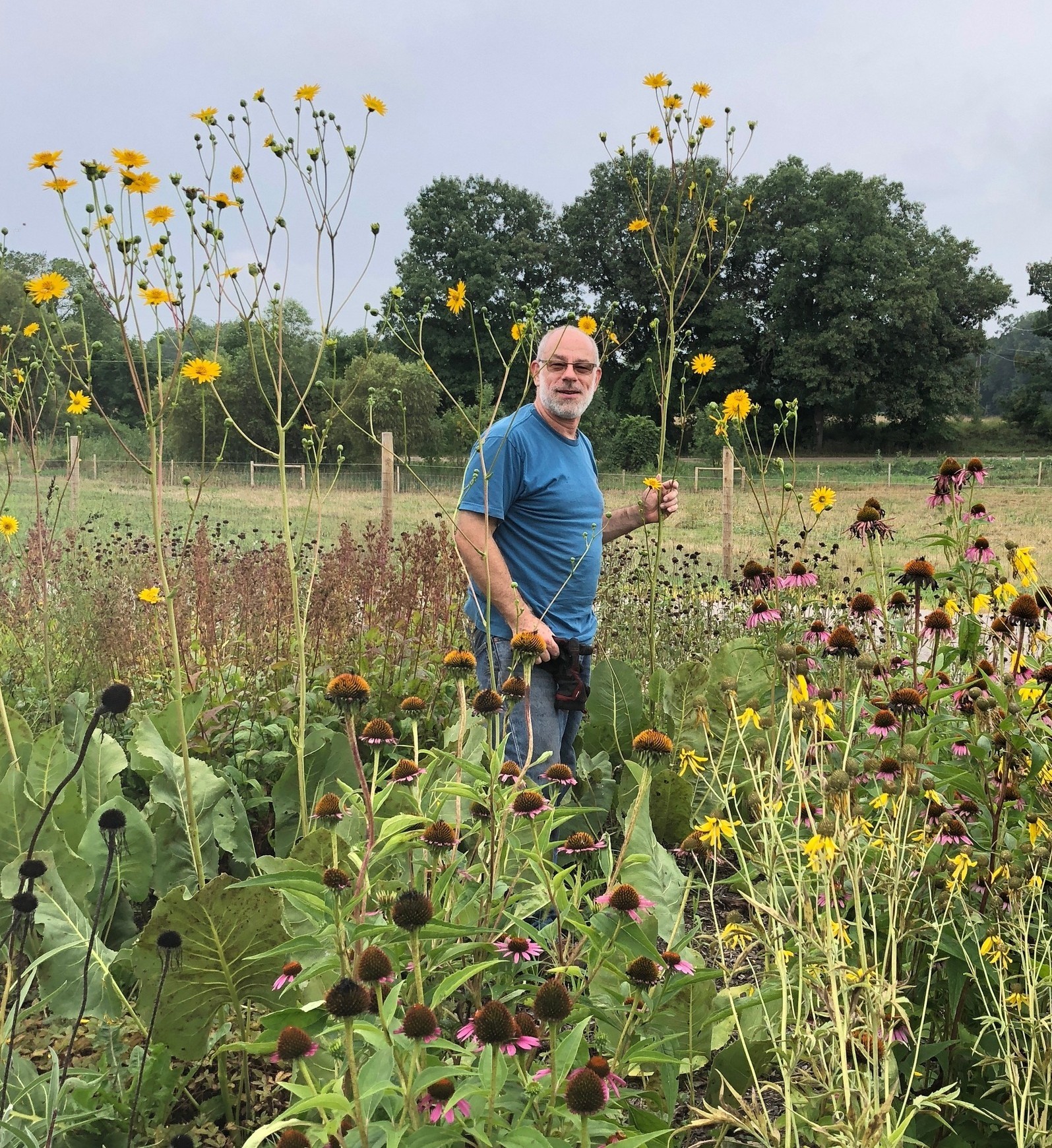Spring sunlight brightens the greenhouse where farmer Evan Chender stands, watering hose in hand. The jets of water shower colorful rows of cauliflower, marigolds, turnips, lettuce, beets and bok choy — plants that have just begun to sprout.
“This is where we do all of our seedling production,” says Chender, who owns the 2-acre farm The Culinary Gardener in Weaverville.
“We buy seeds, and we do the entire process ourselves. It’s all about having that ultimate control over everything. Because with farming, there are so many things that are out of your control.”
For over a decade, the 36-year-old has produced high-end vegetables for a very specific market: restaurants. But after months of market uncertainty following Tropical Storm Helene — including the closure of several high-profile Asheville restaurants — there is a lot that’s out of Chender’s control.
Among the restaurants that have shuttered since the disaster are Cucina 24 and Rhubarb, two of Chender’s biggest accounts. Founding chef John Fleer permanently closed Rhubarb in February, citing impacts from Helene; Cucina 24 has yet to reopen after chef and owner Brian Canipelli died suddenly in early February.
Both restaurants were well-known for their commitment to sourcing from local farmers. With their closures, Chender lost about 25% of his annual sales — which equates to $170,000 a year, a number the farmer recites without hesitation.
“I don’t know what I’m going to do now, honestly,” says Chender, noting that he also recently lost about a half-acre, or 20%, of his growing space when the landowner decided to use it for nonagricultural purposes.
“It’s going to be a lost year, and it’s a hard thing to swallow knowing that.”
A declining market
“Farms and restaurants are very similar in that they are always operating at absolutely the line where there’s very, very little margin for error,” says Sarah Hart, communications and engagement director for the Appalachian Sustainable Agriculture Project (ASAP), which helps create and expand markets for local food.
In 2024, restaurants accounted for nearly 12% of overall sales for farms in ASAP’s Appalachian Grown network, which covers 16 counties within 100 miles of Asheville, including areas of Tennessee, Virginia, South Carolina and Georgia..
Taking into account all markets — including restaurants, as well as farmers markets, community-supported agriculture (CSA) programs, grocery stores, food relief sites and more — Helene impacted the income streams of 60% of the 185 farmers who responded to ASAP’s most recent Appalachian Grown Producer Survey, conducted in December.
Like Chender, Aaron Grier, co-owner of Gaining Ground farm in Leicester, is among the Western North Carolina growers feeling the strain of recent restaurant closures. “We’ve got awesome restaurants in Asheville, and we’ve got awesome chefs,” he says. “I think we’ve all just got a heavier lift in front of us to maintain the beauty that Asheville has been.”
Like Chender, Grier’s business relied heavily on purchases from Rhubarb and Cucina 24. Together, the two accounts made up 20% of annual sales from Grier’s 70-acre vegetable-growing operation.
“Those have been the two biggest supporters of small producers in town, and having them both gone is hard, not only for our sales, but for the local food movement,” he says.
Looking at this year’s peak growing season “feels a little scarier this year,” he adds. Both he and Chender say they’re scaling back on planting this season.
“Cucina 24 was a restaurant that would buy, like, 300 pounds of tomatoes a week from me,” says Chender. “So where are those going to go?”
Chender is also trimming his pepper-growing efforts. “We do a very diverse array of peppers, and some of them are very specific,” he says. “It feels like it may not be worth trying to grow all these specific peppers if I’m not sure if I have an outlet for them.”
Eggs in many baskets
Another post-Helene pivot for WNC farmers has been identifying and expanding into alternative markets.
Immediately following the storm, Chender temporarily sold to distributors in Charlotte, Atlanta and Knoxville, Tenn., making up to three trips per week outside WNC for sales. “It was really stressful, really exhausting and very challenging. And in the end, it proved to be too much,” he says.
Chender also found another poststorm market outlet in nonprofits and human services organizations, including World Central Kitchen and Foothills Food Hub in Marion. According to the ASAP survey, 25% of local farms are now selling to food relief sites, up from 11% in 2020. Before 2020, ASAP did not ask about food relief sites as a market outlet.
“COVID ushered in more grant funding for food relief nonprofits to purchase locally and generally increased the food-buying budgets for these nonprofits,” Hart says. “With the additional funding, those relationships have been sustained over time and grown stronger, contributing more farmers to sell to food relief.”
Since Helene, many WNC nonprofits have had even larger budgets for buying from local farms, she adds. And survey respondents reported that, like Chender, new relationships they built with food sites in the wake of the disaster helped cushion the loss of restaurant sales.
Pastured egg producer Wendy Brugh, owner of Dry Ridge Farm in Madison County and president of ASAP’s board of directors, says that before October 2024, about 50% of her sales were to restaurants, 23% were carton sales to retail grocers, and the rest were direct sales through local farmers markets. But in the days after Helene, with most restaurants and some grocery stores closed, Brugh found herself with 2,000 dozen eggs on her hands.
In the short term, she cut her losses, she says, by redirecting them to food hubs, like TRACTOR Food & Farms in Spruce Pine, that have federal funding allocated for buying from local farms. But by January, two of her largest restaurant accounts, Vivian and ELDR — together contributing $10,000 to her business annually — announced permanent closure, both citing economic damage from Helene.
Dry Ridge’s bottom line was also indirectly affected by reduced restaurant sales to Mountain Food Products, a local distributor that Brugh’s farm supplies.
So, in the long term, she was forced to flip her business model. At the end of December, Dry Ridge’s restaurant sales were down to 25% and retail carton sales had risen to 45%. By early April, retail and restaurant sales each accounted for about 35% of sales, with the remaining share from direct sales at tailgate markers. But the future remains unclear.
“I anticipate that the restaurants that have made it through winter will have a spring similar to the post-COVID spring — locals will be happy to be out. But for some restaurants, it’ll be too little too late,” Brugh says, predicting more closures before June.
“Also, tariffs won’t help — for restaurant expenses nor for customers wanting to spend money out with costs being higher everywhere.” (See sidebar for more on tariffs.)
Lingering pandemic impacts
Declining farm-to-restaurant sales has been a trend since COVID-19, Hart says. But farmers note that COVID-era market shifts both differed from and informed post-Helene pivots.
During COVID, restaurant closures seemed indefinite, says Brugh, whereas, during Helene it was a waiting game for the water to come back on. “COVID caused permanent shifts in how I move my product; COVID also made me realize I needed to diversify our markets way more than I had,” she explains. “Therefore, the pivot during Helene was a little bit easier, because I was already more diversified, because I had a grocery customer, I had some relief organization customers.”
Chender says that, for his business, the losses from Helene feel a lot harder and bigger than those from COVID. “I was younger, I was smaller, I had way less employees, I had the energy to pivot really hard, and I was able to successfully pivot,” he says.
During the pandemic he received a Paycheck Protection Program (PPP) loan to support his payroll and a $25,000 relief grant from the U.S. Department of Agriculture. Since Helene, Chender’s gotten a total of $34,000 in disaster relief grants and GoFundMe donations to buffer losses and help sustain his payroll.
As a way to help both WNC’s struggling farms and restaurants, part of ASAP’s Helene response has been a reboot of its COVID-era Appalachian Farms Feeding Families program, which pays farms to provide CSA boxes or grow produce for businesses and agencies. The program is currently pairing farms with early care and education centers, but this spring, it plans to begin paying farms to provide CSA boxes to restaurant staff members and provide fresh ingredients for restaurant menus, Hart says.
Beyond the economic impact of restaurant closures, the loss of the restaurants themselves is hard to process, says Chender, who was close friends with Cucina 24 owner Canipelli. “This was about people’s love and passions for food and cooking and hospitality,” he says. “It’s also [about] Asheville losing a lot of the vibe of Asheville — special restaurants that people adore — and then what are we left with? We’re left with more corporate restaurants and hotels.”
The bonds between local growers and restaurants can be very personal, Grier says. “The people who are delivering to you [are asking,] ‘How are your kids?’ ‘How’s the farm?’ ‘This looks a lot better than it did last year.’ ‘This tastes different because of the rain or the drought.’ You know, it’s a deeper relationship.”
Both Chender and Grier say they hope restaurants that have reopened will step up to fill the gaps left in the local market by places that have closed. And with consistency, Grier adds — not just when they need a local item to highlight on the chalkboard.
“The restaurant industry is hurting, other farmers are hurting, Western North Carolina’s hurting,” Grier says. “That’s at the forefront of our minds: caring about the people who are out there struggling in our little ecosystem, hoping that we can all come out as intact as possible. And I think we can. I think if we’re important to each other, we’re going to support each other.”










